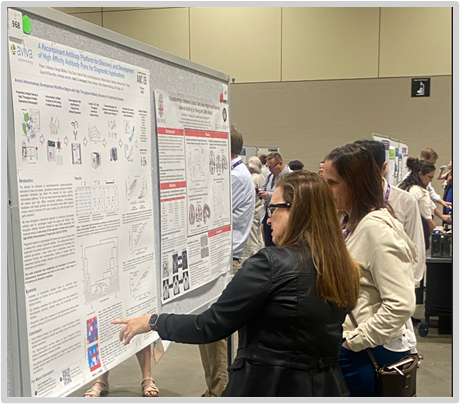
AAIC 2025: Highlights from the Alzheimer’s and Dementia Research Conference
This year’s Alzheimer’s Association International Conference (AAIC) drew more than 11,000 participants from across the globe, both in person and virtually. It was the largest meeting yet for the dementia research community, underscoring the urgency and momentum in the field. The conference focused on advances in diagnosis, treatment, and prevention of Alzheimer’s disease and other dementias, and several developments stood out to us as particularly impactful for the future of clinical practice and research.
Biomarkers Take Center Stage
Biomarker research was front and center at AAIC 2025. Many sessions emphasized how the field is moving toward multi-marker strategies and making use of ultra-sensitive detection platforms. Thanks to advances in assay technology, researchers are now able to generate large multiplex datasets that provide a more complete picture of disease mechanisms. This broader approach is expected to improve not only our understanding of disease progression but also how patients respond to different therapies.
Aviva was proud to contribute to this focus on biomarker innovation through the poster we presented, which showcased the development of high-performance recombinant antibodies for biomarker detection. Recombinant antibodies provide the sensitivity and reproducibility needed to power the next generation of diagnostic assays, a critical factor as the field shifts toward multi-marker panels and precision-driven approaches.
 Aviva's Director of Strategic Business Development & Collaborations, April Livengood PhD, shares our Recombinant Antibody Platform for Discovery and Development of High Affinity Antibody Pairs for Diagnostic Applications
Aviva's Director of Strategic Business Development & Collaborations, April Livengood PhD, shares our Recombinant Antibody Platform for Discovery and Development of High Affinity Antibody Pairs for Diagnostic Applications
New Guidelines for Blood-Based Biomarkers in Alzheimer’s Diagnosis
Perhaps the most significant announcement at AAIC was the release of the first clinical practice guideline for blood-based biomarker (BBM) tests in Alzheimer’s diagnosis and management, published by the Alzheimer’s Association on July 29, 2025. This guideline is a key advancement for the field. Until now, Alzheimer’s diagnosis has relied primarily on cerebrospinal fluid (CSF) biomarker analysis or amyloid PET imaging—methods that, while highly informative, are invasive, expensive, and often inaccessible outside of specialized centers.
The new guideline provides evidence-informed recommendations for integrating blood-based biomarker tests into clinical care for patients with objective cognitive impairment presenting for specialized memory-care, where Alzheimer's disease is the suspected underlying cause. It includes two key recommendations:
- Triage use: BBM tests with ≥90% sensitivity and ≥75% specificity can be used to identify which patients should proceed to additional testing.
- Diagnostic replacement use: BBM tests with ≥90% sensitivity and ≥90% specificity can serve as a replacement for amyloid PET or CSF biomarker testing in patients with cognitive impairment, particularly in specialized memory care settings.
The Alzheimer’s Association emphasized that blood-based tests are not yet ready for universal, primary care-level use, but their adoption in specialty practices represents a critical step toward wider accessibility. By reducing reliance on more invasive methods, these guidelines may improve early detection, lower costs, and open the door for earlier and more equitable intervention worldwide.
See the July 29, 2025 publication: Alzheimer's Association Clinical Practice Guideline on the use of blood-based biomarkers in the diagnostic workup of suspected Alzheimer's disease within specialized care settings
Real-World Data on Anti-Amyloid Therapies
Another major theme was the growing availability of real-world evidence on anti-amyloid therapies, including LEQEMBI® (lecanemab-irmb), which has already gained regulatory approval in multiple regions. Several presentations demonstrated that patient outcomes in clinical practice are aligning closely with, and in some cases surpassing, results from clinical trials. These data reinforce confidence that anti-amyloid therapies are not only effective in controlled trial environments but also in broader patient populations.
Particularly notable were findings that patients receiving early intervention with lecanemab experienced meaningful cognitive and functional benefits. Importantly, safety data from real-world settings mirrored what was seen in pivotal studies, supporting the drug’s long-term utility in disease management.
Recent news release highlighting exciting clinical results in early Alzheimer's patients: Early Alzheimer’s Patients Continue to Benefit from Four Years of LEQEMBI® (lecanemab-irmb) Therapy New Clinical Data Presented at AAIC
Looking Ahead
AAIC 2025 highlighted a field that is rapidly evolving on multiple fronts: from earlier and less invasive diagnostic strategies to more effective, targeted therapeutic options. The momentum behind blood-based biomarkers and real-world evidence for anti-amyloid therapies signals a much-needed shift toward practical and scalable solutions.
At Aviva, we are committed to supporting this progress by delivering the tools researchers need to explore individual biomarkers and complex biomarker signatures with confidence. Our recombinant antibody portfolio is designed for the sensitivity, specificity, and reproducibility that diagnostic platforms demand.
You can download our AAIC 2025 poster here



